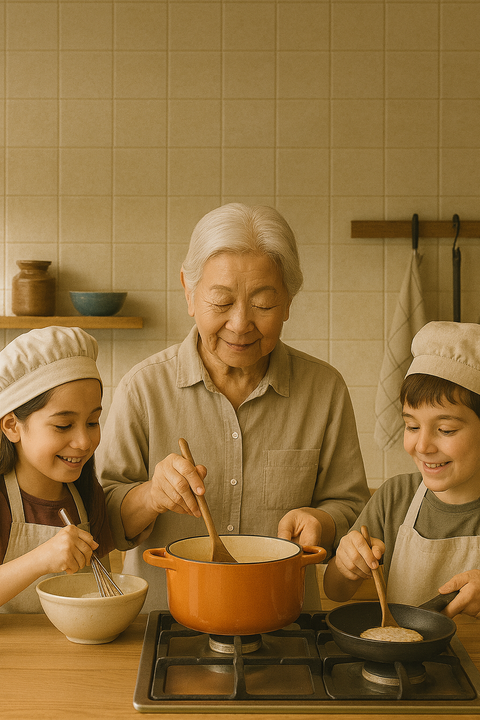Keiro-no-Hi, Japan’s Respect for the Aged Day, is a national celebration of elders shaped by community and school traditions. One personal story brings this heartfelt day to life.
When I was a kid, I lived with my grandma. In our home, birthdays were for kids—we expected our favourite meal and a little celebration at home with cake. But for adults? They didn’t seem to care much, and my grandma was no exception.
Once a year though, everything changed—Keiro-no-Hi, Japan’s Respect for the Aged Day, came around. That’s when I made my grandma something special: a handmade katatataki-ken (肩たたき券)—a tickets that she could turn in for a massage from me. Eventually she would come to me with a smile, hand me the ticket, and say: “Today’s the day.” I’d gently massage her shoulders, and she’d sit quietly, just enjoying the moment. At the time, I didn’t think much of it. But looking back, I realize how meaningful that small gesture was—for both of us.
What Is Keiro-no-Hi?
Keiro-no-Hi is a Japanese national holiday celebrated on the third Monday of September. It’s a day to honor the elderly and express appreciation for everything they’ve done—for families, communities, and society.
The holiday began in 1947 in a small village in Hyogo Prefecture and became a national holiday in 1966. Unlike other holidays, it’s not centered around gifts or parties. Instead, it’s built around respect, recognition, and quiet gratitude.
A Day That Meant More Than a Birthday
In our family, we didn’t really celebrate my grandma’s birthday until she became quite old. And she never seemed to mind. Women like her didn’t expect to be celebrated—they were always thinking about others. Keiro-no-Hi stood out, not because we, as a family, planned something big—but because society encouraged it. Schools asked us to make cards and teachers explained the importance of honouring elders. Even the News would feature local celebrations for senior citizens on TV.
It was like Japan gave us all permission to pause, and say thank you, and for a kid like me, that made a difference. I probably wouldn’t have thought to do anything otherwise, but because of that holiday, I had a reason to create something, to hand it to my grandma, and to sit beside her for a moment of quiet appreciation.
A Taste of Tradition in Modern Form
Just like Keiro-no-Hi reminds us to slow down and appreciate the people who matter, we believe in crafting things with that same spirit. That’s why we created our Japan-inspired chili oil — made with organic miso and full of rich umami flavor.
It’s not your average chili crisp. While chili crisps often focus on heat and crunch, ours is rooted in Japanese culinary tradition, offering a deeper, rounder flavour that honours the slow, thoughtful art of cooking — much like how Keiro-no-Hi honors the slow, thoughtful lives of our elders.
Those massage tickets weren’t fancy. Just scraps of paper with scribbled writing, but they meant something. They were a little child’s way of saying:
“I see you. I appreciate you.”
Now, as an adult, I realize how special it was that I had that opportunity. Keiro-no-Hi gave me a reason to express something we didn’t say out loud very often—but always felt.
Not every culture sets aside a day to honour elders, and not every family celebrates in the same way, but I’m thankful that Japan does.
Keiro-no-Hi isn't loud. It’s gentle. It’s thoughtful. It’s needed.
Sometimes, a quiet gesture—a handmade ticket, a soft shoulder massage, or even a spoonful of something crafted with care—can say more than words ever could.
About the Author
Hi, I’m Fumi — a Japanese chili oil maker and co-founder of Abokichi. Our chili oil - OKAZU is a unique, small-batch chili oil inspired by traditional Japanese flavors, made with organic miso and packed with deep, natural umami.
Our version is different from your typical chili crisp or spicy oil. In Japan, it’s known as taberu rayu, or “edible chili oil,” and we’re proud to be the only makers in North America producing organic miso-based taberu rayu using clean, high-quality ingredients.
We also make ABO Miso Soup, an upcycled, instant miso soup that’s ready with just hot water. It’s made from the byproduct of sake brewing and naturally rich in amino acids thanks to fermentation. That means it delivers bold umami flavor without using animal products or MSG.
As someone rooted in Japanese food and culture, I occasionally share the stories, values, and everyday moments that shape how I cook — and how I live. Not always, but when something feels worth sharing.




